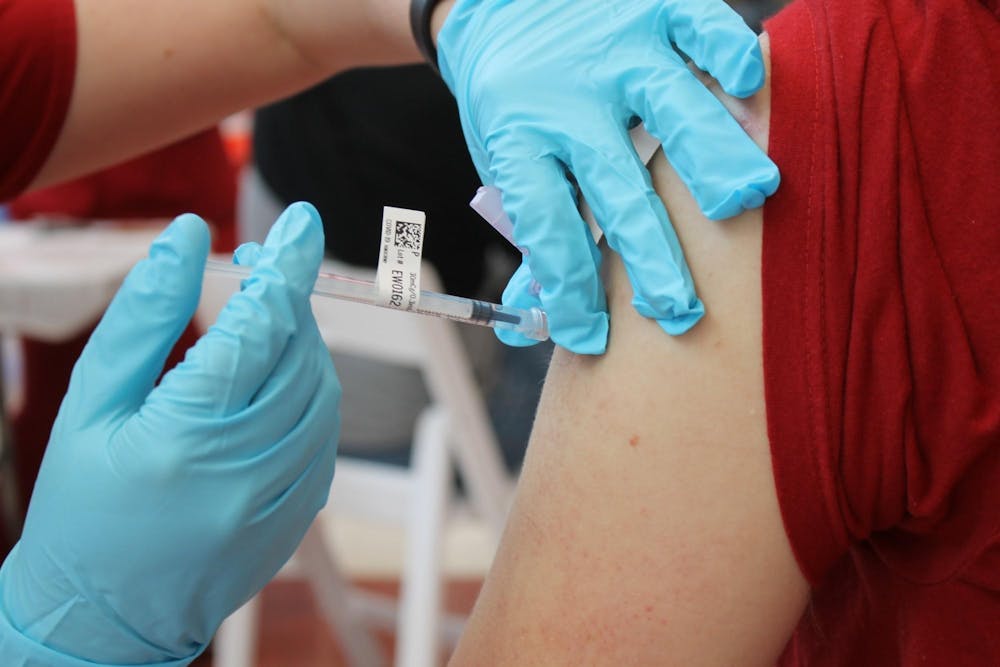High levels of flu, RSV, norovirus and an indicator of the virus that causes COVID-19 were detected in Bloomington wastewater Jan. 9.
Each virus harbors potentially severe symptoms amid a nationwide surge, typical in winter. Here’s what to know and how to protect yourself:
WastewaterSCAN, a program based at Stanford University that monitors infectious diseases in sewage nationally, shared the data from Dillman Road Wastewater Treatment Plant just south of Bloomington.
In late December, Indiana wastewater had high levels of influenza A and RSV, or respiratory syncytial virus, and very high levels of COVID-19, according to the Centers for Disease Control and Prevention. The Midwest had the highest wastewater viral activity level for COVID-19 among all regions.
Wastewater treatment plants in Carmel, Jeffersonville and South Bend all had high levels of flu, RSV, COVID-19 and norovirus in their most recent samples, according to WastewaterSCAN.
The flu, RSV and COVID-19 each share many cold-like symptoms, according to the National Foundation for Infectious Diseases. Norovirus causes vomiting and diarrhea that typically lasts one to three days.
All four can spread from people who have them or contaminated surfaces. Norovirus also spreads through contaminated food or water.
Anyone can get these illnesses, but younger children, older adults and people with certain pre-existing conditions or who are immunocompromised are at greater risk of developing severe flu, RSV, norovirus or COVID-19. In some cases, this can lead to hospitalization or death.
Some people develop Long COVID after having COVID-19, which is a chronic condition that can last from three months to multiple years. Women, Latino people, people who are 65 or older or have underlying health conditions and others are more likely to develop Long COVID.
How to prevent the spread
According to Monroe County Health Department Health Administrator Lori Kelley, the best practices for staying healthy from the flu, RSV and COVID-19 are similar. They include washing hands, disinfecting surfaces, avoiding contact with others while sick, resting and remaining hydrated.
Kelley wrote in an email that hand sanitizer alone does not work well against norovirus, and people should wash their hands for at least 20 seconds. Norovirus can survive temperatures up to 145 degrees, she said, so people with norovirus should not prepare food or care for others when sick.
The CDC also recommends purifying and increasing airflow indoors, staying home when sick, wearing a mask and testing for respiratory viruses. All U.S. households can get four free COVID-19 tests delivered from COVIDtests.gov. For information on flu, RSV and norovirus testing, visit the CDC’s website.
Where to get COVID and flu vaccinations
Norovirus doesn’t currently have a vaccine, but testing is underway. The CDC recommends an RSV vaccination for adults over 75 or between 60-74 at increased risk of severe RSV. It also suggests people 32-36 weeks pregnant during RSV season receive the vaccination for their baby, or give babies 8 months old or younger monoclonal antibodies.
The CDC recommends everyone over 6 months old, with rare exceptions, receive an annual flu vaccination and stay up to date on their COVID-19 vaccination.
Here’s where you can get updated vaccines:
- IU Health’s two urgent care locations in Bloomington have flu and COVID-19 vaccines and offer walk-ins.
- CVS offers flu and COVID-19 vaccination appointments at its seven Bloomington locations.
- Walk-in vaccinations are available at Kroger’s five pharmacies in Bloomington.
- IU faculty, staff and students can get walk-in flu and COVID-19 shots at the Student Health Center.
- For more places to get vaccinations, visit vaccines.gov.




